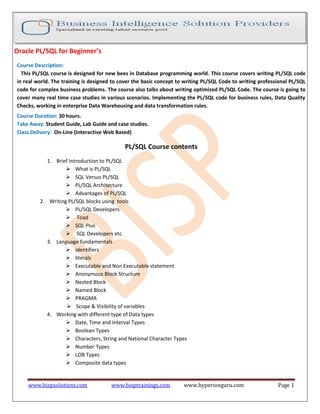
Oracle fundamentals and plsql for beginners
- 1. Oracle PL/SQL for Beginner’s Course Description: This PL/SQL course is designed for new bees in Database programming world. This course covers writing PL/SQL code in real world. The training is designed to cover the basic concept to writing PL/SQL Code to writing professional PL/SQL code for complex business problems. The course also talks about writing optimized PL/SQL Code. The course is going to cover many real time case studies in various scenarios. Implementing the PL/SQL code for business rules, Data Quality Checks, working in enterprise Data Warehousing and data transformation rules. Course Duration: 30 hours. Take Away: Student Guide, Lab Guide and case studies. Class Delivery: On-Line (Interactive Web Based) PL/SQL Course contents 1. Brief Introduction to PL/SQL What is PL/SQL SQL Versus PL/SQL PL/SQL Architecture Advantages of PL/SQL 2. Writing PL/SQL blocks using tools PL/SQL Developers Toad SQL Plus SQL Developers etc. 3. Language fundamentals identifiers literals Executable and Non Executable statement Anonymous Block Structure Nested Block Named Block PRAGMA Scope & Visibility of variables 4. Working with different type of Data types Date, Time and Interval Types Boolean Types Characters, String and National Character Types Number Types LOB Types Composite data types www.bispsolutions.com www.bisptrainings.com www.hyperionguru.com Page 1
- 2. 5. Control Structures IF-THEN-ELSE Statement Case Statement GOTO Statement NULL Statement 6. Different types of loops Simple Loop WHILE- Loop FOR- Loop Labels in Loop Scope Rules Exit Statement 7. Exception Handler What is Exception Handling How to Handle Exception Structure of Exception Handling Types of Exception Handling SAVE Exception in Bulk Collect PRAGMA init Exception 8. Working with Objects & Collection Describing Object Constructor method on objects Nested Table VARRAY Associative Array Collection Methods Manipulate Collection Distinguish between the different types of collections and when to use them 9. Working with Records Declaring Records Benefit of using record Passing Values To and From Record Comparing two records 10. Cursors in PL/SQL Why cursor is used Declaring Cursors Different Types of cursor Cursor Attributes Sending parameter to cursor Different ways of using cursor Cursor Variable (Reference Cursor) Advantage of using cursor variable over normal cursor www.bispsolutions.com www.bisptrainings.com www.hyperionguru.com Page 2
- 3. Passing Cursor variable as parameter Restriction on cursor Variables 11. Dynamic SQL and PL/SQL When to use Declaring dynamic SQL and PL/SQL by using DBMS_SQL package Declaring dynamic SQL and PL/SQL by using Execute Immediate Using Dynamic SQL in FORALL statement Dynamic statement using binding variables Advantage of using Dynamic SQL and PL/SQL 12. Bulk processing of data using Bulk Collect What is Bulk collect operation How does it impact performance Declaring BULK COLLECT operation with simple select statement BULK COLLECT with cursors BULK COLLECT using FORALL statement Catching exception in Bulk collect using SAVE EXCEPTION 13. Working with Procedures, Functions and Packages Basic of stored procedure Basics of functions Basics of packages Advantage of using procedures , function and packages Passing cursor variables to procedures , function and packages Recompiling functions and stored procedures Forward declaration Declaring and using persistent global variables in packages Creating table Function Function overloading Restrict Reference Pragma Pinning packages in the SGA with dbms_shared_pool.keep 14. Debugging and Error tracking of PL/SQL code Using Error log message tables Using some built in packages Using tools like PL/SQL developers 15. Working with Triggers. Describe Triggers Identify the Trigger Event Types and Body Business Application Scenarios for Implementing Triggers Create DML Triggers using the CREATE TRIGGER Statement Identify the Trigger Event Types, Body, and Firing (Timing) Differences between Statement Level Triggers and Row Level Triggers Create Instead of and Disabled Triggers How to Manage, Test and Remove Triggers? www.bispsolutions.com www.bisptrainings.com www.hyperionguru.com Page 3
- 4. 16. Overview of some advanced PL/SQL topics Table Function Pipelined table function Error log tables Hints in PL/SQL 17. Tuning of PL/SQL program 18. Case Studies a. Implement Data Transformation Using PL/SQL code Part I b. Implement Data Transformation Using PL/SQL code Part II c. Implement Data Transformation Using PL/SQL code Part III d. Enforce Data Quality Check with PL/SQL Code I e. Enforce Data Quality Check with PL/SQL Code II www.bispsolutions.com www.bisptrainings.com www.hyperionguru.com Page 4